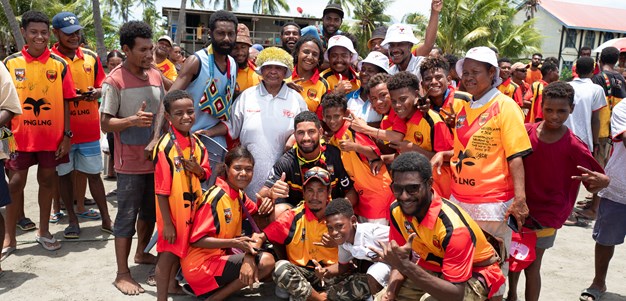

As rugby league entered a brave new world, pledging its commitment to send homophobia the way of the dinosaurs and three-point tries, NRL boss Dave Smith spoke of heroes.
Behind him stood Greg Inglis, one of the modern day greats, and a man who is no doubt a hero in the starry eyes of thousands from the peninsulas of Cape York to Mornington and beyond.
Heroes are those that change the fabric of the game, said Smith.
Men like Ian Roberts, who nearly 20 years ago came out as the first openly gay athlete in Australian sport, who as one of the hardest men in the game's history proved an athlete's sexuality was wholly inconsequential when it came to playing the game.
Inglis, who himself represents a minority as a not-so-loud but fiercely proud Aboriginal man, says the time is ripe for a new hero in the game.
And if a gay player were to make the extraordinarily brave – at least up until now – step to come out, Inglis believes the move would be met with the reaction it deserves – an ordinary one. A shrug of the shoulders. 'Who cares?' 'So what?'
"Especially in the environment we are in now, and the culture of the Australian sporting world, I honestly think it's each to their own," said Inglis.
"If individuals want to come out and promote that they're gay I'm all for it."
The Kangaroos and Queensland superstar was adamant the reaction amongst the rugby league community to any player coming out would mirror that which has greeted NBA player Jason Collins and American football defensive end Michael Sam, who have both been received warmly as their respective sport's first openly gay players.
"I'm a firm believer in respecting what others are and who they are," said Inglis, who adds he has never witnessed homophobia in his rugby league career.
"The environment that I grew up in and the teams that I have been involved in have always embraced that and that's just the way the culture is."
This is big. This is the equivalent of a LeBron James or a Lionel Messi coming out and saying who gives a stuff what team they bat for, can they play?
It's a sentiment that is being spruiked far and wide across Australia's sporting landscape, as representatives from rugby league, AFL, rugby union, football and cricket came together in a world first to commit to anti-homophobia policies.
Never before has a country's major professional sports banded together to stamp out discrimination based on sexual orientation, and policies and awareness campaigns aimed at stamping out discrimination based on sexual orientation will be in place by August.
Rugby league's culture has not always been as inclusive as it makes out, or needs to be. Comments made by Newcastle player Ryan Stig last October, in which he compared homosexuality to alcoholism and a "politically correct charade", caused outrage throughout the code and supporters, but the NRL's anti-vilification code burnt like damp wood in the wake of the incident, all smoke and no heat, as Stig went without sanction from club or code.
But in a sign rugby league's commitment to the new policies goes beyond just paying lip service, Smith made specific mention of Stig's "appalling" homophobic rant, admitting the NRL should have taken a stand on the slurs.
"We still have moments where I'm not proud of something which happens in our game, like when one of our players made the most disparaging remarks about homosexuality last year," said Smith.
"We should have been stronger about our condemnation of those remarks.
"We've learned from that experience and we'll take a harder line against anyone in our game making such appalling comments today.
"That's why the NRL wants to be part of this campaign about homophobia."
You can play! AUS sports working together to stamp out homophobia http://t.co/hPKrEh0JDz @NRL @BinghamCup2014
— Dave Smith (@DaveSmithNRL) April 9, 2014While the fact no player has come out since Roberts did almost 20 years ago shows just how far the NRL has to go in making the code a more inclusive one for homosexuals, the challenge looms as one of the final frontiers for a game played by thousands regardless of colour, creed or class.
Rugby league has been championed as the people's game since its inception over a century ago, and always prided itself on the ability to celebrate its differences rather than allow them to divide it.
Whether the NRL's commitment to stamping out homophobia will go beyond making the right noises and shaking the right hands remains to be seen, but if it does the game's fabric will be richer for it, because as Smith concluded his address on Wednesday, "that’s how real heroes are made".

